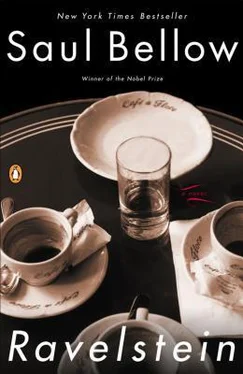Ravelstein would frequently say to me, "There's something in the way you tell anecdotes that gets to me, Chick. But you need a real subject. I'd like you to write me up, after I'm gone…."
"It depends, doesn't it, on who beats whom to the barn?"
"Let's not have any bullshit about it. You know perfectly well that I'm about to die…."
Of course I knew it. Indeed I did.
"You could do a really fine memoir. It's not just a request," he added. "I'm laying this on you as an obligation. Do it in your after-supper-reminiscence manner, when you've had a few glasses of wine and you're laid back and making remarks. I love listening when you are freewheeling about Edmund Wilson or John Berry-man or Whittaker Chambers when you were hired at _Time__ in the morning and fired by him before lunch. I've often thought how well you deal with a story when you're laid back."
There was no way I could refuse to do this. He clearly didn't want me to write about his ideas. He had expounded those fully himself and they're available in his theoretical books. I make myself responsible for the person, therefore, and since I can't depict him without a certain amount of self-involvement my presence on the margins will have to be tolerated.
Death was closing in on him and it was transmitting the usual advance reminders, telling me first of all that in preparation for his end I should not forget that I was his senior by some years. At my advanced age my every third thought should be of death. But the odd thing was that I was now the husband of Rosamund, one of Ravelstein's students. And Ravelstein was such a paradoxical character, you see, that one of the effects of his friendship was to make me unaware of the oddity of my condition-in my seventies I was married to a young woman. "It's odd only when you view the thing from the outside," said Ravelstein. "She fell in love with you and that was why there was no stopping her."
In choosing me or setting me up to write this memoir, he obliged me to consider my death as well as his. And not only his death from shingles, Guillain-Barrй, etc., but a good many other deaths as well. It was collection time for an entire generation. For instance: I was on the very day of this conversation sitting with Ravelstein in his extravagant, lavish bedroom. The drape was pulled aside from the east window and we faced the wide-open blue of the shoreless Lake.
"What do you think when we look in this direction?" said Ravel stein.
"I think of good old-or bad old-Rakhmiel Kogon," I said.
"He has more of a grip on you than he has on me," said Ravelstein.
Maybe so. Still, I couldn't look in that direction-eastward-without seeing Kogon's apartment building, and then you'd count upward or downward trying to locate the tenth floor, but you could never be certain that you were looking at the right window. Rakhmiel, who had figured since the forties in my life and since the fifties in Ravelstein's would be one of the crowd taking off at intervals. You never knew who would be next. He had had several kinds of major surgery: his prostate gland had been removed last year-Rakhmiel said he'd never had much use for it anyway. I did not feel myself to be in the threatened category for I'd fallen in love with a young woman and had married her. So I was not quite ready to deal with the departing contingent. It was one of those curious moments of illumination that I don't feel I can pass over. Rakhmiel was highly educated, but to what end? Every corner of his apartment was stuffed with books. Every morning, Rakhmiel sat down and wrote in green ink.
Rakhmiel was neither a large man nor a healthy one, but he was physically conspicuous just the same-compact and dense, highhanded, tyrannically fixated, opinionated. His mind was made up once and for all upon hundreds of subjects and maybe this was the sign that he had completed his course. I felt I was summing him up for an obituary. It is possible that I was trying to replace Ravelstein with Rakhmiel so that I wouldn't have to think about Ravelstein's death. I would much rather think of Rakhmiel's death. So I re viewed his life and his works for a sketch on him while Ravelstein lay on his pillow with eyes shut, thinking thoughts of his own.
Rakhmiel was, or had been once, a redhead, but the red hair had worn away and what remained was a reddish complexion-in medieval physiology, sanguine: hot and dry. Or, better yet, choleric. His face wore a police expression and he often looked, walking fast, as if he were on a case-on his way to serve a warrant or make a pinch. His conversation, I thought, had an interrogatory tone. Very articulate, he spoke in complete sentences, at high speed and very impatiently. When you came to know him better you would understand that there were two conspicuous foreign elements in his makeup-one German and the other British. The German part of him was Weimar-style toughness. I suppose I knew Weimar in its nightclub version. Postwar Europe of the twenties was sold on hardness. The war veterans were hard, the political leaders were hard. Hardest of all of course was Lenin, ordering hangings and shootings. Hitler entered the competition when he took power in the thirties. Immediately he had Captain Roehm and other Nazi colleagues shot. Rakhmiel and I would at one time discuss this sort of thing quite often.
Lots of bitter facts, too horrible for contemporaries to contemplate. We can't actually bring ourselves to acknowledge them. Our souls aren't strong enough to bear that. And yet one can't give oneself a pass. A man like Rakhmiel would feel obligated to face up to the fact that this viciousness was universal. He believed that everybody had his share of it. You could find these murderous impulses in any person of mature years. In certain cases, like Rakhmiel's own, you could identify them in your physical structure as equivalents not necessarily of war but of widespread Russian, German, French, Polish, Lithuanian, Ukrainian, and Balkan shameful enormities.
Well, there was the Germanic side of him. Then there was the Brit component. Rakhmiel, whose name translates as "Save me, God" or "Be merciful, God, unto me," had also modeled himself on English dons and in time became a don himself. He had been in England during the war. He was blitzed in London, where he was gathering and interpreting intelligence. Then he taught at the Lon don School of Economics. Later he was an Oxford professor and divided his time between England and the U. S. He was the author of many learned books. He wrote daily, copiously, endlessly, and without hesitation, in his green ink. "The Intellectuals" were his principal subject, and in style he was Johnsonian. Sometimes he would remind you of Edmund Burke, but mostly it was Samuel Johnson whose tone you heard. I see nothing wrong with this. The challenge of modern freedom, or the combination of isolation and freedom which confronts you, is to make yourself up. The danger is that you may emerge from the process as a not-entirely-human creature.
The arts of disguise are so well developed that you are sure to undercount the number of bastards you have known. Not even a genius like Rakhmiel was able to conceal the storminess or, if you prefer, the wickedness of his nature. He had ideas of decency which went back to the novels of Dickens, but he had wicked REMs-I borrow the term from the sleep specialists-wide-awake rapid eye movements. He looked like an irritable and highly volatile English clubman, very red in the face. In America, where people are not familiar with such types, his idiosyncrasies were bound to be misunderstood. People saw a dumpy, slightly paunchy but strong, short man in very old tweeds. To be ill-dressed is a donnish tradition going back to the Middle Ages, and at Oxford and Cambridge you still saw the holes in academic gowns patched with Scotch tape. There was a noticeable sourness coming from Rakhmiel Kogon's clothing. He looked like a tyrant, with the tyranny baked into his face. This was not well dissembled with meekness and Christian forbearance, or with civility. He wore a fedora when he went out and carried a heavy stick-"to hit the peasants with," he used to joke. And it was a joke, because his strong subject was civility. With civility he had opened up a new vein and everybody in the university world was mining it.
Читать дальше












